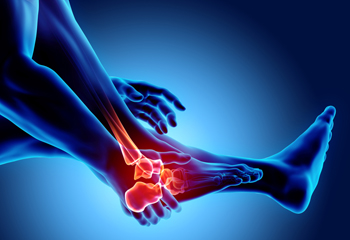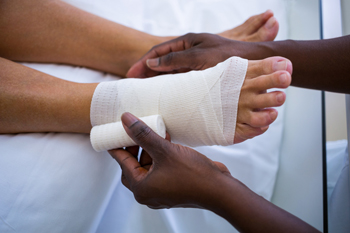
 The pain from plantar fasciitis is often noticed first thing in the morning. It occurs as a result of an inflamed plantar fascia, which is the band of tissue on the sole of the foot. The purpose of the plantar fascia is to connect the toes to the heel, and straining the plantar fascia can cause it to become inflamed. This can happen from standing on hard surfaces for extended periods of time throughout the day, or from wearing shoes that do not fit correctly. Additionally, people who enjoy running and those who are overweight may be prone to developing plantar fasciitis. If you have heel pain, it is recommended that you seek the counsel of a podiatrist who can treat plantar fasciitis.
The pain from plantar fasciitis is often noticed first thing in the morning. It occurs as a result of an inflamed plantar fascia, which is the band of tissue on the sole of the foot. The purpose of the plantar fascia is to connect the toes to the heel, and straining the plantar fascia can cause it to become inflamed. This can happen from standing on hard surfaces for extended periods of time throughout the day, or from wearing shoes that do not fit correctly. Additionally, people who enjoy running and those who are overweight may be prone to developing plantar fasciitis. If you have heel pain, it is recommended that you seek the counsel of a podiatrist who can treat plantar fasciitis.
Plantar fasciitis is a common foot condition that is often caused by a strain injury. If you are experiencing heel pain or symptoms of plantar fasciitis, contact one of our podiatrists from Achilles Foot Clinic. Our doctors can provide the care you need to keep you pain-free and on your feet.
What Is Plantar Fasciitis?
Plantar fasciitis is one of the most common causes of heel pain. The plantar fascia is a ligament that connects your heel to the front of your foot. When this ligament becomes inflamed, plantar fasciitis is the result. If you have plantar fasciitis you will have a stabbing pain that usually occurs with your first steps in the morning. As the day progresses and you walk around more, this pain will start to disappear, but it will return after long periods of standing or sitting.
What Causes Plantar Fasciitis?
There are some risk factors that may make you more likely to develop plantar fasciitis compared to others. The condition most commonly affects adults between the ages of 40 and 60. It also tends to affect people who are obese because the extra pounds result in extra stress being placed on the plantar fascia.
Prevention
There are a variety of treatment options available for plantar fasciitis along with the pain that accompanies it. Additionally, physical therapy is a very important component in the treatment process. It is important that you meet with your podiatrist to determine which treatment option is best for you.
If you have any questions, please feel free to contact one our office, located in the South of Calgary, Alberta. We offer the newest diagnostic and treatment technologies for all your foot care needs.
 Arthritis causes inflammation and stiffness in the joints. There are many different types of arthritis, but the types of arthritis that most often affect the feet are osteoarthritis, rheumatoid arthritis, psoriatic arthritis, and gout. Arthritis progressively worsens over time, but the earlier it is detected, the sooner measures can be taken to slow its progression and preserve the health of your feet. The earliest signs of arthritis are joint stiffness, pain, swelling, and warmth. Sometimes the joints may begin to appear deformed or develop bone spurs. If you suspect that you may have arthritis in your feet, please consult with a podiatrist, who can help you manage this condition.
Arthritis causes inflammation and stiffness in the joints. There are many different types of arthritis, but the types of arthritis that most often affect the feet are osteoarthritis, rheumatoid arthritis, psoriatic arthritis, and gout. Arthritis progressively worsens over time, but the earlier it is detected, the sooner measures can be taken to slow its progression and preserve the health of your feet. The earliest signs of arthritis are joint stiffness, pain, swelling, and warmth. Sometimes the joints may begin to appear deformed or develop bone spurs. If you suspect that you may have arthritis in your feet, please consult with a podiatrist, who can help you manage this condition.
Arthritis can be a difficult condition to live with. If you are seeking treatment, contact one of our podiatrists from Achilles Foot Clinic. Our doctors can provide the care you need to keep you pain-free and on your feet.
Arthritic Foot Care
Arthritis is a joint disorder that involves the inflammation of different joints in your body, such as those in your feet. Arthritis is often caused by a degenerative joint disease and causes mild to severe pain in all affected areas. In addition to this, swelling and stiffness in the affected joints can also be a common symptom of arthritis.
In many cases, wearing ill-fitting shoes can worsen the effects and pain of arthritis. Wearing shoes that have a lower heel and extra room can help your feet feel more comfortable. In cases of rheumatoid arthritis, the arch in your foot may become problematic. Buying shoes with proper arch support that contour to your feet can help immensely.
Alleviating Arthritic Pain
It is best to see your doctor for the treatment that is right for your needs and symptoms. Conditions vary, and a podiatrist can help you determine the right method of care for your feet.
If you have any questions, please feel free to contact one our office, located in the South of Calgary, Alberta. We offer the newest diagnostic and treatment technologies for all your foot care needs.
Flat feet is a condition in which the arch on the bottom of the midfoot region is absent. In infants and toddlers, the arch is not yet developed and having flat feet is typical. As the child ages, a normal arch usually develops. However, for some individuals the arch may not develop, and they will continue to have flat feet into adulthood. Flat feet will often be asymptomatic, not causing pain or any other problems. Unfortunately, some people can experience foot pain or discomfort due to their flat feet. People with flat feet are also more likely to have overpronation, a gait pattern in which the feet turn too far inward while walking. Overpronation can sometimes cause foot pain to develop. If you have flat feet and are experiencing foot discomfort or pain, it is recommended that you see a podiatrist for treatment.
Flatfoot is a condition many people suffer from. If you have flat feet, contact one of our podiatrists from Achilles Foot Clinic. Our doctors will treat your foot and ankle needs.
What Are Flat Feet?
Flatfoot is a condition in which the arch of the foot is depressed and the sole of the foot is almost completely in contact with the ground. About 20-30% of the population generally has flat feet because their arches never formed during growth.
Conditions & Problems:
Having flat feet makes it difficult to run or walk because of the stress placed on the ankles.
Alignment – The general alignment of your legs can be disrupted, because the ankles move inward which can cause major discomfort.
Knees – If you have complications with your knees, flat feet can be a contributor to arthritis in that area.
Symptoms
Treatment
If you are experiencing pain and stress on the foot you may weaken the posterior tibial tendon, which runs around the inside of the ankle.
If you have any questions, please feel free to contact one our office, located in the South of Calgary, Alberta. We offer the newest diagnostic and treatment technologies for all your foot care needs.
 An ulcer that develops on the foot is a wound that may not heal. This type of ailment can cause severe pain and discomfort and is common among diabetic patients. Redness on and around the affected area is often the first sign of a foot wound, and additional symptoms can include an unpleasant odor and possible drainage. There are several reasons why foot wounds may occur. These can consist of living a sedentary lifestyle, nerve damage, or circulation problems. Additionally, medical conditions such as high blood pressure and diabetes may make developing wounds on the feet more likely. If you are prone to foot wounds, it is strongly suggested that you are under the care of a podiatrist who can effectively treat this problem.
An ulcer that develops on the foot is a wound that may not heal. This type of ailment can cause severe pain and discomfort and is common among diabetic patients. Redness on and around the affected area is often the first sign of a foot wound, and additional symptoms can include an unpleasant odor and possible drainage. There are several reasons why foot wounds may occur. These can consist of living a sedentary lifestyle, nerve damage, or circulation problems. Additionally, medical conditions such as high blood pressure and diabetes may make developing wounds on the feet more likely. If you are prone to foot wounds, it is strongly suggested that you are under the care of a podiatrist who can effectively treat this problem.
Wound care is an important part in dealing with diabetes. If you have diabetes and a foot wound or would like more information about wound care for diabetics, consult with one of our podiatrists from Achilles Foot Clinic. Our doctors will assess your condition and provide you with quality foot and ankle treatment.
What Is Wound Care?
Wound care is the practice of taking proper care of a wound. This can range from the smallest to the largest of wounds. While everyone can benefit from proper wound care, it is much more important for diabetics. Diabetics often suffer from poor blood circulation which causes wounds to heal much slower than they would in a non-diabetic.
What Is the Importance of Wound Care?
While it may not seem apparent with small ulcers on the foot, for diabetics, any size ulcer can become infected. Diabetics often also suffer from neuropathy, or nerve loss. This means they might not even feel when they have an ulcer on their foot. If the wound becomes severely infected, amputation may be necessary. Therefore, it is of the upmost importance to properly care for any and all foot wounds.
How to Care for Wounds
The best way to care for foot wounds is to prevent them. For diabetics, this means daily inspections of the feet for any signs of abnormalities or ulcers. It is also recommended to see a podiatrist several times a year for a foot inspection. If you do have an ulcer, run the wound under water to clear dirt from the wound; then apply antibiotic ointment to the wound and cover with a bandage. Bandages should be changed daily and keeping pressure off the wound is smart. It is advised to see a podiatrist, who can keep an eye on it.
If you have any questions, please feel free to contact one our office, located in the South of Calgary, Alberta. We offer the newest diagnostic and treatment technologies for all your foot care needs.